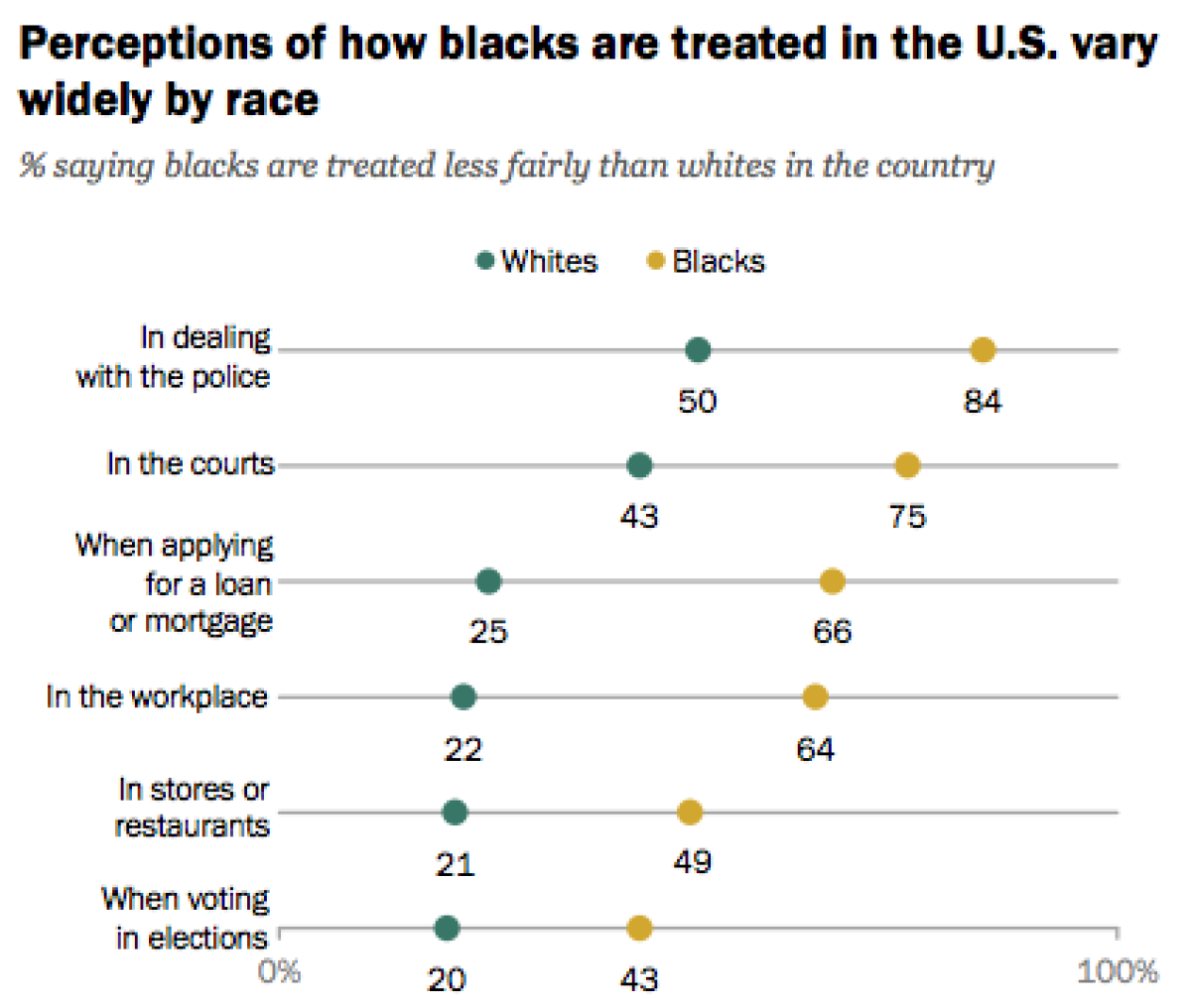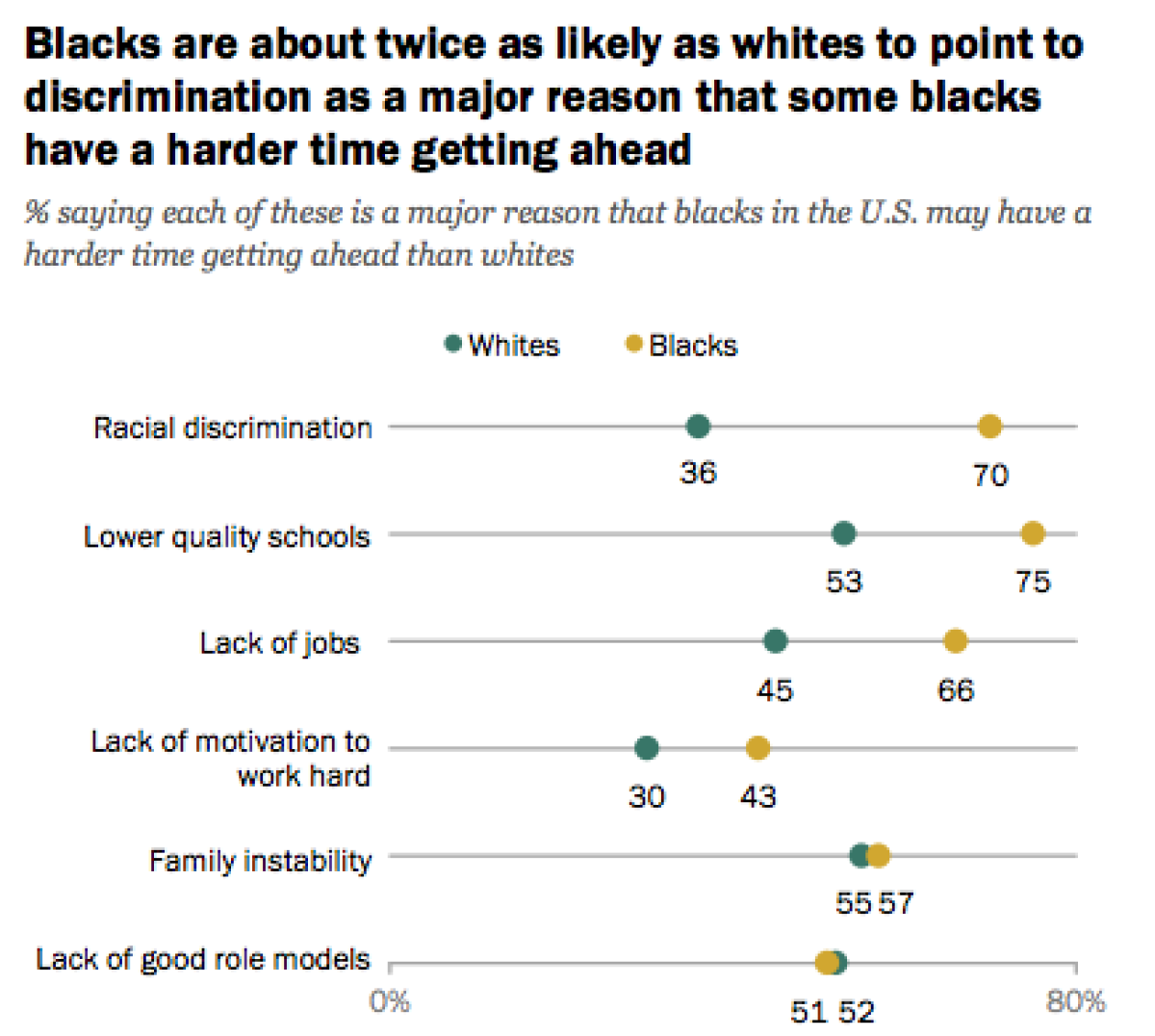There’s a deep divide in how blacks and whites see race. New numbers prove it.
A report that asked thousands of people about their views of racism has found the nation to still be deeply divided, with majorities of black and white Americans holding nearly opposite views of the impact of skin color.

About 4 in 10 black Americans doubt the the country will ever reach the point where they are treated as equals to whites, according to the Pew Research Center survey released Monday. Yet, nearly 4 in 10 white Americans think that’s already happened. A majority of white people believe blacks are treated the same as them when applying for a mortgage, in the workplace, in restaurants, and at the voting booth, the survey found.
In almost every category measured, including police treatment of blacks, the Black Lives Matter movement, politics and the presidency, "there's a huge polarization between black and white Americans," said Pew’s Juliana Horowitz.
"You hear that anecdotally, that there is a divide in the country," and the numbers bear it out, added Horowitz, an associate research director at the Washington organization.
While about 4 in 10 whites surveyed said there was too much of a focus today on race, nearly 6 in 10 blacks said there is too little. Forty-six percent of whites described race relations as generally good, yet 61% of blacks said they are generally bad.

White and black Americans also disagreed on the nature of racism. When asked about the biggest problem when it comes to discrimination against black people, just about 1 in 5 whites said it was that racism was built into U.S. laws and institutions. Nearly twice that share of blacks believed the same. Meanwhile, 7 in 10 whites said individual people discriminating against blacks was the biggest issue in racism.
"Blacks are far more likely – at 71% – to say they have personally experienced discrimination in their lives," Horowitz said. "Yet 3 in 10 whites also say they have been treated differently because of their race. On the other hand, when asked if their race has made life harder, 40% of blacks said it had while only 5% of white people said it had for them."
Pew researchers said they were spurred to conduct the survey, which asked questions of 3,769 adults between Feb. 29 and May 8, by national controversies over race, policing and violence, such as shootings of unarmed black men that catapulted the Black Lives Matter movement into prominence. Researchers also wanted to ask about President Obama’s effect on race relations before the end of his second term.
The survey had a margin of error of 2.2 percentage points.
Support of Black Lives Matter was high among black Americans, with 65% giving their support. At 4 in 10, whites were less supportive. On Obama, the groups also stood apart. Slightly more whites said Obama has made race relations worse (32%) than those who said he’s made them better (28%). But a little more than half of blacks said he has improved race relations.
The survey also asked Latinos about their views of racism against black Americans and found their views more likely to closely align with the views of black Americans.
Latinos were more likely to say race relations were bad (57%) than to say they were good (37%). Half of Latinos also agreed that not enough attention is paid to race today, and nearly 4 in 10 said Obama has improved race relations. While about 4 in 10 blacks said say racial inequality and race relations were common topics in their conversations with friends and family (compared with 1 in 5 whites saying the same), 3 in 10 Hispanics said the issues frequently come up in conversations.
Latinos were also the most likely to talk about immigration in their conversations.
One area where Latinos were more likely to agree with whites was on how to improve race relations.
“Far more Americans say that when it comes to improving race relations, it’s more important for people to focus on what different racial and ethnic groups have in common (55%) than say it’s more important to focus on the unique experiences of different racial and ethnic groups (31%),” researchers wrote.
“This is particularly the case among whites, who are about twice as likely to say the focus should be on what different groups have in common (57%) rather than what makes different groups unique (26%).” Latinos “also share this view by a margin of 54% to 37%.”
“Blacks are more evenly divided: 44% say it’s more important for people to focus on what makes different racial and ethnic groups unique, while roughly the same share (45%) say the focus should be on what different groups have in common.”
While the differences were stark, the report said there were some groups of whites that were closer in their views to blacks. “Whites who are younger than 30 are far less likely than older whites to say there is too much focus on race,” researchers wrote, and also more likely to support Black Lives Matter. White Democrats were also generally more sympathetic than white Republicans to the views of black Americans on race.
Still, blacks and whites are “sharply divided,” researchers wrote, adding that “for many blacks, racial equality remains an elusive goal.”
Jaweed Kaleem is The Times' national race and justice correspondent. Follow him on Twitter and Facebook.
ALSO
Supreme Court overturns Texas abortion restrictions
Trump's failed Baja condo resort left buyers feeling betrayed, angry
Jesse Williams talks racism, equality and why black lives matter in powerful BET Awards speech
UPDATES:
4:20 p.m.: This article was updated with additional information about the survey’s findings on Latino views.
This article was originally posted at 8 a.m.
Sign up for Essential California
The most important California stories and recommendations in your inbox every morning.
You may occasionally receive promotional content from the Los Angeles Times.








